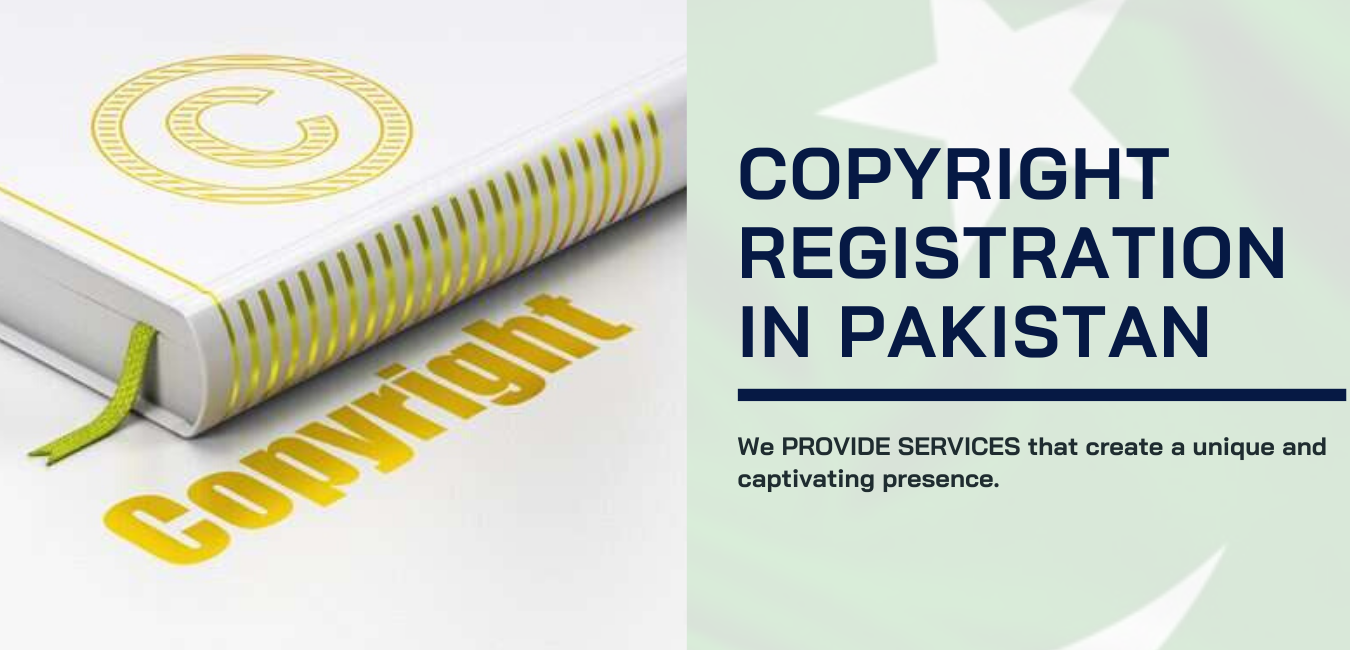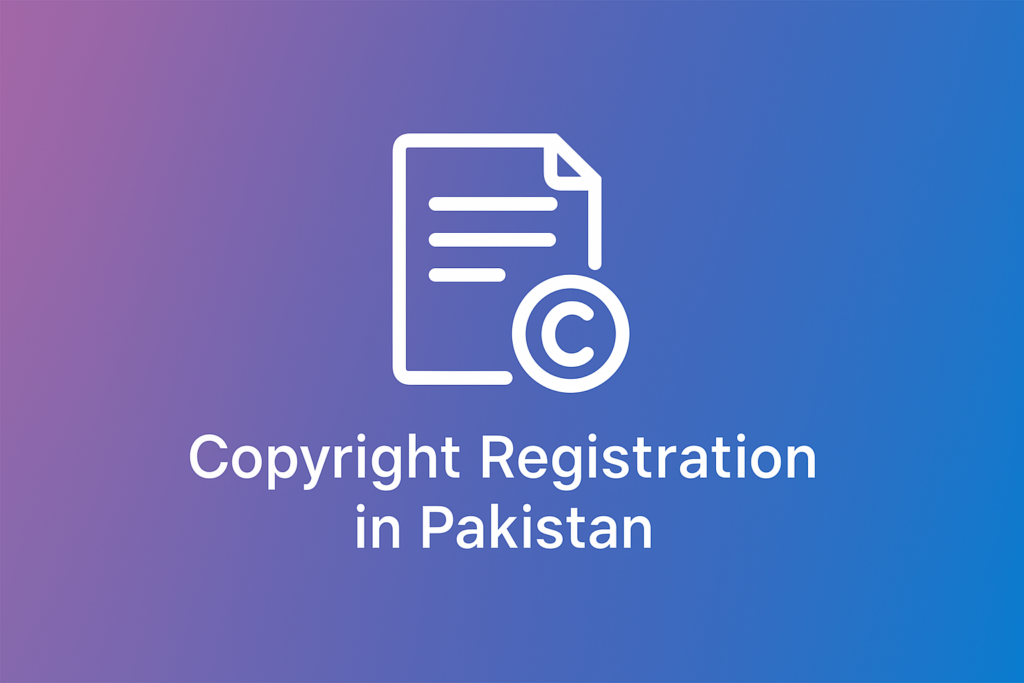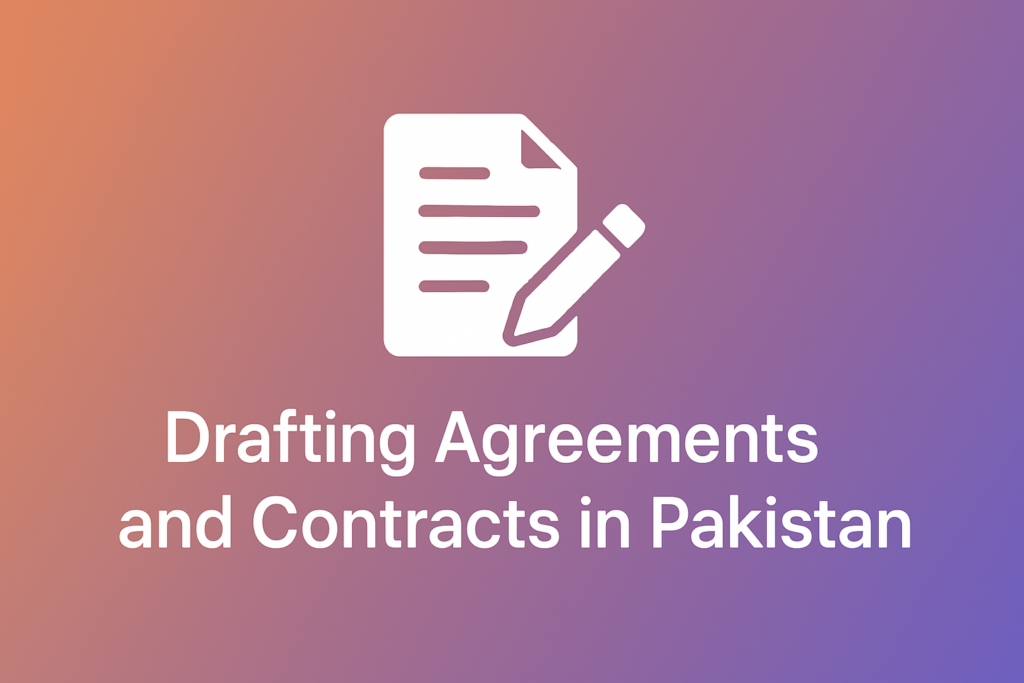Copyright registration protects your creative work. It’s crucial for authors, artists, and creators.
In Pakistan, copyright registration ensures your intellectual property is legally recognized. This is important to safeguard your creations from unauthorized use. Whether you write books, compose music, or design graphics, copyright helps secure your rights. Registering your work provides you with legal backing in disputes.
It also affirms your ownership publicly. Understanding how to register copyrights in Pakistan can be complex. This guide aims to simplify the process for you. We will explore the steps, benefits, and requirements. Protect your creative efforts and enjoy peace of mind. Let’s dive into how you can register your copyright in Pakistan.
Introduction To Copyright
Copyright is a crucial aspect of protecting your creative work. Whether you are a writer, artist, musician, or software developer, copyright ensures your creations are legally safeguarded. In Pakistan, understanding copyright is essential for preserving your intellectual property rights.
Definition
Copyright is a legal right granted to the creator of an original work. It provides exclusive rights to use, distribute, and modify the work for a specific period. In simple terms, it means you control how your work is used and who can use it.
Imagine you wrote a book. Copyright ensures no one else can publish or sell it without your permission. It protects your work from unauthorized use and ensures you benefit from your creativity.
Importance
Why is copyright important? It incentivizes creativity and innovation. Knowing your work is protected encourages you to create more without the fear of theft.
Consider this: you spent months developing software. Without copyright, anyone could copy and sell it, reaping the benefits of your hard work. Copyright ensures you are rewarded for your efforts.
Furthermore, copyright provides legal recourse if someone uses your work without permission. This protection is vital for maintaining the integrity and value of your creations.
Have you ever wondered how much creative work goes unprotected? Without copyright, countless artists and creators would lose their rights and potential income. Take control of your work and secure your creative future with copyright registration in Pakistan.

Credit: www.linkedin.com
Legal Framework
Understanding the legal framework of copyright registration in Pakistan can help you protect your creative work. Whether you are an artist, author, or a software developer, knowing the relevant laws and international conventions is crucial. Let’s dive into the specifics.
Relevant Laws
Pakistan’s copyright laws are governed by the Copyright Ordinance of 1962. This is the primary piece of legislation for copyright protection in the country. It has been amended several times to keep up with technological and societal changes.
The ordinance outlines the types of works that can be protected. These include literary, musical, and artistic works, among others. It also stipulates the duration of protection and the rights of the copyright holders.
One important aspect of the Copyright Ordinance is that it grants both economic and moral rights. Economic rights allow you to earn from your work, while moral rights protect your reputation. For instance, you can prevent others from distorting your work in a way that harms your standing.
International Conventions
Pakistan is also a member of several international conventions related to copyright. The most significant of these is the Berne Convention for the Protection of Literary and Artistic Works. This ensures that your work receives protection in other member countries, without the need for separate registrations.
Additionally, Pakistan is part of the World Trade Organization (WTO) and follows the Agreement on Trade-Related Aspects of Intellectual Property Rights (TRIPS). This agreement sets down minimum standards for many forms of intellectual property regulation, including copyrights.
Being part of these international conventions means that Pakistan has to align its laws with global standards. This international alignment can be beneficial if you aim to distribute your work internationally. Are you planning to reach a global audience with your creations? Knowing these details can make a significant difference.
Understanding the legal framework, including relevant laws and international conventions, can empower you to take the right steps in protecting your work. Dive into the specifics and make informed decisions to safeguard your creative endeavors.
Eligibility Criteria
Understanding the eligibility criteria for copyright registration in Pakistan is crucial for safeguarding your intellectual property. This means knowing which works are covered and who can register. Let’s break it down to make it simple and clear for you.
Works Covered
In Pakistan, the copyright laws cover a wide range of creative works. This includes literary works like books and articles, musical compositions, and artistic creations such as paintings and sculptures. Cinematographic films and computer software are also protected.
Even your architectural designs and dramatic works like plays can be copyrighted. Suppose you have a unique choreography or a sound recording; these too fall under the works covered. It’s essential to identify what kind of work you have to ensure it’s eligible for copyright.
Who Can Register
So, who can actually register for copyright in Pakistan? The creator of the work, naturally, holds the primary right. This can be an individual artist, an author, or a composer. If you’re the original creator, you’re eligible to register your work.
But what if you have transferred your rights to someone else? In that case, the current owner of the copyright can register. For instance, if a publishing company has bought the rights to your book, they can apply for registration. Remember, having clear documentation of ownership is crucial.
It’s interesting to note that even legal heirs can register for copyright. If you’re inheriting creative works from a relative, you can protect them under your name. This makes it easier to maintain and control the legacy of artistic and literary works.
Think about this: Are you missing out on protecting your creative efforts? Understanding who can register helps ensure your work remains safe. Always check your eligibility before you proceed with registration.
By grasping these criteria, you can navigate the copyright registration process in Pakistan more effectively. Protect your creations; they are your intellectual property.
Registration Process
Registering a copyright in Pakistan is crucial for protecting your creative works. It ensures your intellectual property is legally recognized and safeguarded. This process involves submitting specific documents and following a series of steps. Let’s delve into the details.
Required Documents
To register a copyright, you need to gather certain documents. These include:
- A completed application form
- A copy of your work
- Proof of identity
- Proof of ownership
- A fee receipt
Ensure all documents are accurate and complete. This helps avoid delays in your registration process.
Step-by-step Guide
Here is a simple guide to register your copyright in Pakistan:
- Download the application form from the IPO Pakistan website.
- Fill out the form with correct details.
- Attach a copy of your work with the form.
- Provide proof of identity and ownership.
- Pay the required fee. Keep the receipt.
- Submit the application form along with all documents.
- Wait for the application to be processed.
After submission, the IPO Pakistan office will review your application. If everything is in order, you will receive a registration certificate.
Fees And Costs
Copyright registration in Pakistan involves certain fees and costs. These can vary based on the type of work being registered. Applicants should budget for these expenses when planning their registration.
Copyright registration in Pakistan is an essential step for safeguarding your creative work. Understanding the fees and costs involved is crucial, as it ensures you are well-prepared for the process. Let’s break down the expenses to give you a clear picture of what to expect.
Application Fees
The application fee for copyright registration in Pakistan varies depending on the type of work you are registering. For instance, literary works such as books and articles typically have lower fees compared to musical or artistic works.
Expect to pay around PKR 1,000 for a basic literary work registration. If you are registering a musical composition, the fee might be higher, around PKR 2,500.
These fees are subject to change, so always check the latest rates on the official website before proceeding.
Additional Costs
Apart from the application fees, you might encounter additional costs. If you opt for professional assistance, such as hiring a lawyer or a copyright consultant, their fees can vary significantly.
Consider transportation costs if you need to visit the copyright office in person. Printing and copying documents can also add to your expenses.
Additionally, if there are any objections or disputes regarding your copyright claim, you may incur further legal costs.
Have you budgeted for these potential expenses? Planning ahead can save you from unexpected financial stress.
Navigating the fees and costs associated with copyright registration in Pakistan can seem daunting. However, being informed helps you manage your budget effectively. Remember, investing in copyright protection is investing in the security of your creative endeavors.
Duration And Renewal
Copyright registration in Pakistan typically lasts for 50 years. Renewal is necessary to extend the protection. Ensure timely renewal to maintain rights.
Copyright registration in Pakistan is a crucial step to protect your creative work. However, knowing how long the protection lasts and how to renew it is equally important. Let’s dive into the duration and renewal process of copyright in Pakistan.
Initial Term
When you register a copyright in Pakistan, the duration of protection varies based on the type of work. For instance, literary, musical, or artistic works are protected for the lifetime of the author plus 50 years after their death.
Cinematographic works and records have a fixed term of 50 years from the date of publication. If you’re creating something in these categories, your work enjoys strong legal protection.
Understanding the initial term helps you plan your creative projects better. It ensures you know how long your work is legally safeguarded.
Renewal Process
What happens after the initial term expires? The good news is, in many cases, you can renew your copyright. However, the renewal process depends on the type of work and specific regulations.
To renew, you typically need to submit an application to the Intellectual Property Organization of Pakistan (IPO-Pakistan). This process may involve a fee and certain documentation.
Don’t assume your copyright automatically renews. Take proactive steps to ensure continuous protection for your work. Have you thought about setting reminders for when your copyright is due for renewal?
By staying informed and proactive, you can safeguard your creative investments for the long term.
Enforcement Of Rights
Copyright registration in Pakistan provides creators with legal protection. This protection is crucial for safeguarding their intellectual property. When rights are enforced, creators can take actions against unauthorized use.
Enforcement of rights ensures that creators receive fair compensation. It also deters others from misusing copyrighted materials. Understanding infringement actions and penalties is essential for protecting your work.
Infringement Actions
Infringement occurs when someone uses copyrighted work without permission. This can include copying, distributing, or displaying the work. In Pakistan, creators can file infringement actions to protect their rights.
Legal actions can be taken in civil courts. The creator must prove ownership and unauthorized use. Courts may order the infringer to stop using the work. They may also award damages to the creator.
Penalties
Penalties for copyright infringement in Pakistan are strict. Offenders may face financial penalties or imprisonment. The severity of penalties depends on the nature of the infringement.
Courts may impose fines on infringers. These fines compensate the creator for losses. In serious cases, imprisonment may be ordered. This serves as a strong deterrent against copyright violations.
Understanding these penalties helps creators safeguard their work. It also educates the public about the importance of respecting intellectual property rights.
Benefits Of Registration
Copyright registration in Pakistan safeguards your creative works. It provides legal protection and exclusive rights. This ensures your intellectual property remains secure.
Copyright registration is often overlooked by many creators in Pakistan, but it carries several significant benefits. Whether you’re an artist, a writer, or a software developer, having your work officially registered can make a big difference in protecting and promoting your creative efforts. Let’s dive into some of the primary advantages of copyright registration.
Legal Protection
Registering your copyright provides you with strong legal backing. If someone tries to use your work without permission, you can take legal action more easily. This registration serves as undeniable proof of ownership.
Without registration, proving ownership of your work can be a lengthy and complex process. Imagine having to show every draft or sketch to prove that an idea was yours first. With copyright registration, this burden is significantly reduced.
Having legal protection can also deter potential infringers. Knowing that you have registered your work might make them think twice before copying or using it without permission. This peace of mind allows you to focus more on creating and less on protecting your creations.
Market Advantage
Copyright registration can give you an edge in the market. It shows others that you take your work seriously and are committed to protecting it. This professionalism can attract more clients and collaborators.
Registered copyrights can also increase the value of your work. Investors and buyers are often more interested in works that have clear ownership. This can lead to better financial opportunities for you.
Additionally, with a registered copyright, you can license your work more confidently. Licensing agreements become easier to negotiate and enforce. This can open up new revenue streams and expand your reach.
Have you ever thought about how many opportunities you might be missing by not registering your work? Consider taking that step today to secure your creations and enhance your market presence.

Credit: www.taxcare.pk
Frequently Asked Questions
How Much Does It Cost To Register A Copyright In Pakistan?
Registering a copyright in Pakistan typically costs around PKR 3,000 to PKR 5,000. Fees may vary slightly.
How To Copyright Something In Pakistan?
To copyright something in Pakistan, apply at the Copyright Office. Submit the application form, work copy, and fee. Ensure all documents are complete and accurate. Your work will be registered, granting you copyright protection.
How Much Does It Cost To Register A Trademark In Pakistan?
The cost to register a trademark in Pakistan is approximately PKR 3,000 to PKR 4,000. Fees may vary.
What Is The Copyright Period In Pakistan?
The copyright period in Pakistan generally lasts for the author’s lifetime plus 50 years after their death. For anonymous or pseudonymous works, it lasts 50 years from publication.
Conclusion
Securing copyright registration in Pakistan ensures protection for your creative works. It offers legal rights and helps prevent unauthorized use. The process may seem complex but is manageable with proper guidance. Protect your creations by registering them. Stay informed and safeguard your intellectual property.
Remember, copyright registration is crucial for all creators. It provides peace of mind and legal support. Don’t delay; register your work today to enjoy these benefits.



